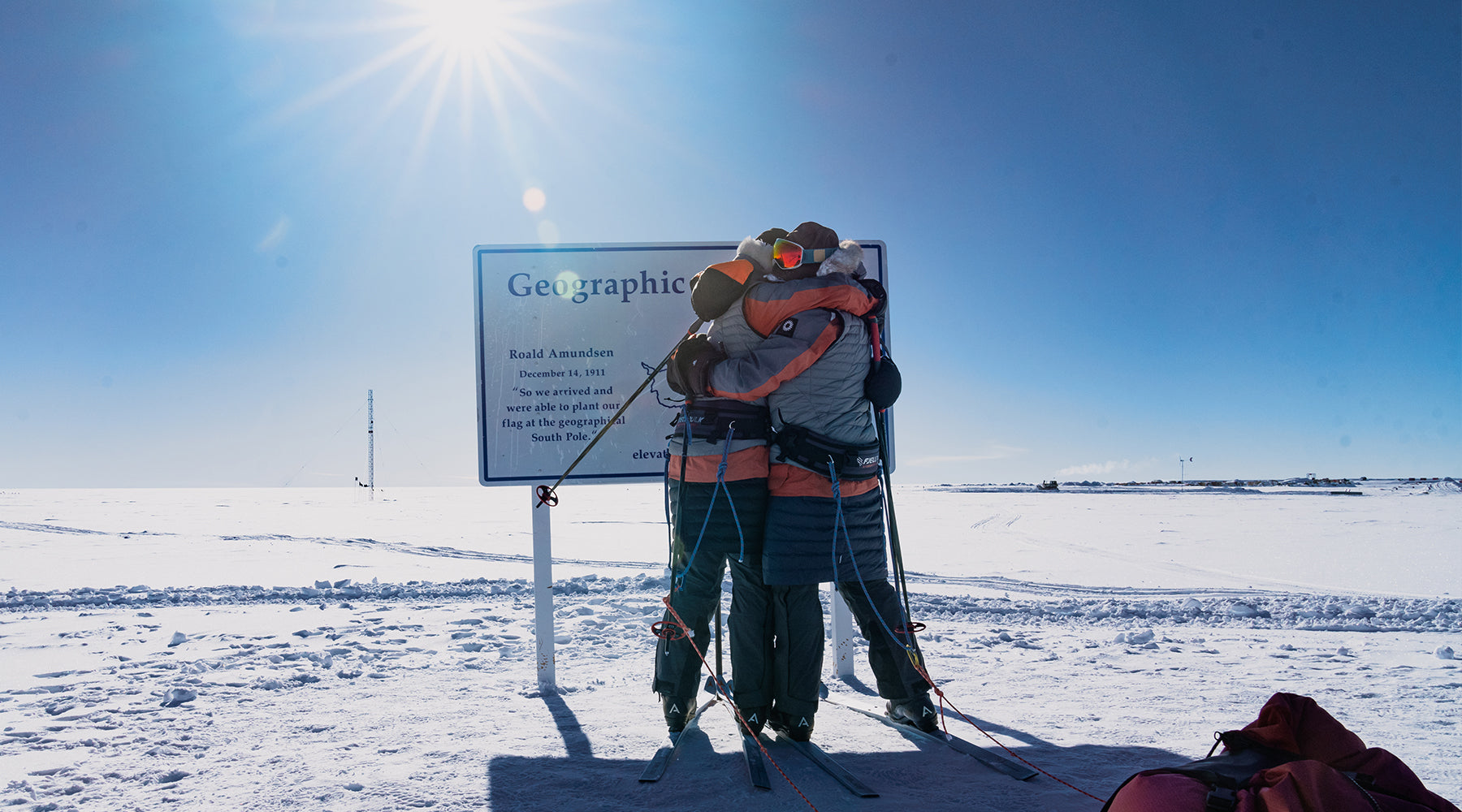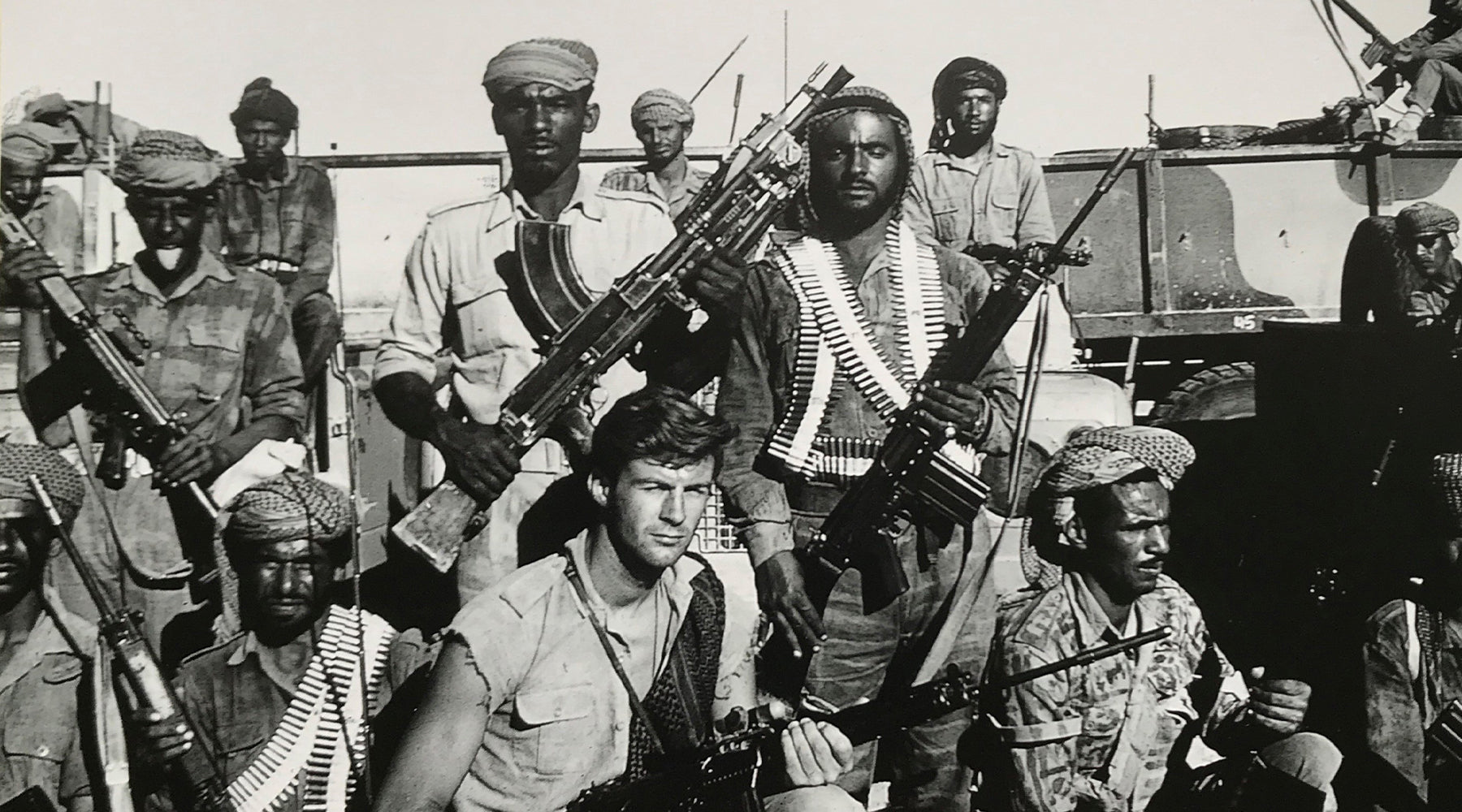
Sir Ranulph Fiennes on Courage, Leadership and the link between Shackleton and Lawrence of Arabia
Sir Ranulph Fiennes has been an honorary judge for the Shackleton Medal for the Protection of the Polar Regions since it was established in 2022. A long-term admirer of Shackleton, he talks to Rachel Halliburton about courage, leadership, and the experiences in his own life that led him to writing about one of Shackleton’s great contemporaries.
Shortly before Frank Hurley’s 1919 film, South, brought the story of Ernest Shackleton’s legendary Endurance voyage to Britain, a film about another man who had displayed remarkable qualities of leadership set England alight. That man was Lawrence of Arabia – a heroic figure who at first glance seems very different from Shackleton. Yet the closer you look at their stories, the more similarities they contain – from their motivation of others to defeat impossible odds to surviving in landscapes as extreme as they were beautiful. No wonder early cinema identified both men as powerful figures in a war-torn world hungry for tales of heroism.
Sir Ranulph Fiennes is no stranger to heroic endeavour, so it feels apt that he has written books examining their experiences and motivations. His vivid biography of Shackleton was published in 2021, while his Lawrence of Arabia: My Journey in Search of TE Lawrence was published at the end of last year. Any explorer worth their salt can recite the litany of what Sir Ranulph himself has achieved. The fact that he was the first person to go round the world via the North Pole and South Pole (by land and sea); his three ascents of Everest, reaching the summit on the final attempt; that legendarily gruesome moment when he amputated his own fingers in his shed after getting frostbite. No surprise, then, that he uses his unique perspective to bring fresh insights into the lives of individuals driven by their desire to achieve the seemingly impossible.
Youthful ideals
I manage to catch Sir Ranulph on the phone on a muggy grey day in the run-up to Christmas. At the age of 79, he is still clearly driven by the vim and vigour that led to him fighting as a British army officer against Marxists in Oman when he was 23. Lawrence – at the age of 28 – was just slightly older when the Arab Revolt started in 1916, but both men faced similar struggles as they pitted youthful ideals against broader geopolitical demands. As the rain falls listlessly outside, Sir Ranulph’s voice evokes the strategically treacherous terrain of the Middle Eastern desert.
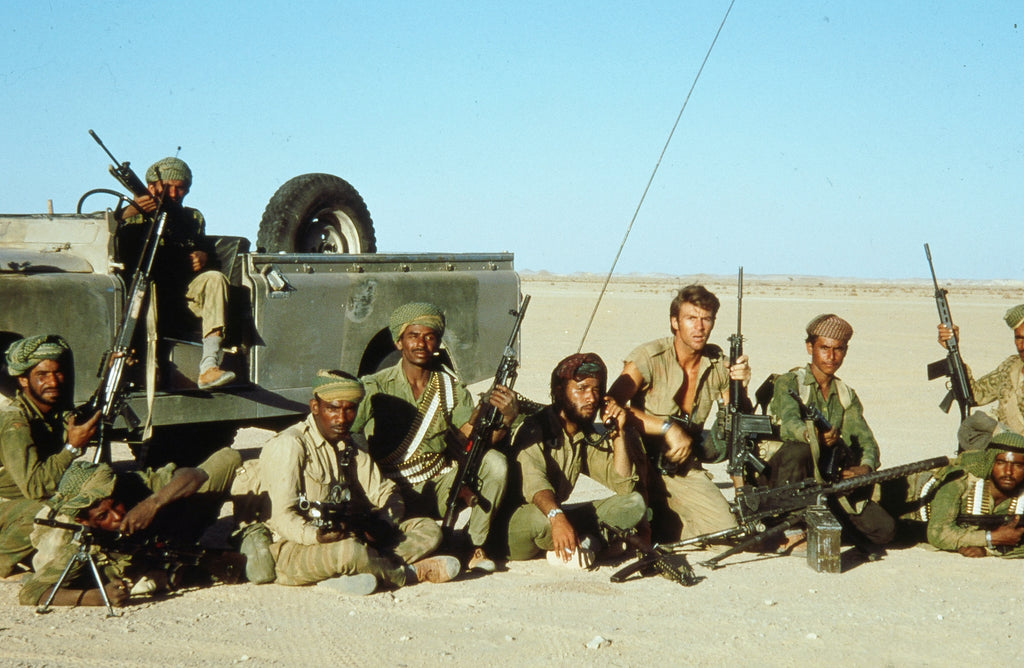
‘Lawrence was physically very very tough,’ he says of the man who worked with Arab warriors to sabotage the Hijaz Railway before fighting their way to drive the Ottomans out of Damascus. ‘He adapted quickly to camel marches that could take weeks over hundreds of miles of desert. He also took part in camel charges in battle. In one extreme situation at the Battle of Aqaba [the famous World War I battle in which the Arabs expelled the Turks from the port city] – he shot his own camel in the back of the head by mistake. It was a very dangerous situation for him and he could have been killed. But he just got off and carried on fighting.’
Tracking down a great leader
In the book, Sir Ranulph talks about how Lawrence, then working for British intelligence at the Cairo Bureau, had made it his mission to find a man with the right qualities to lead the Arab Revolt. Drawing on Lawrence’s own writings in Seven Pillars of Wisdom, he describes his first meeting with Emir Feisal, the man who would end up leading the Arabs into Damascus. Though he was struck immediately by his charisma, ‘Lawrence wanted to know more about his actions on the battlefield. During his talks with some of the officers, Lawrence was told that while under heavy fire from the Turks, Feisal had ridden up and down the Arab line, in full sight of the Turks, and urged his men to stay and fight. In response, not one Arab fled. Lawrence was impressed. This was a true sign of courage and leadership in the white heat of battle.’
Lawrence – unlike many of his colleagues in the Cairo Bureau – had a huge respect for the Arabs he fought with, which proved crucial in winning their trust. For Sir Ranulph, this resonated strongly. When he himself was in Oman he was put in charge of an Arab platoon of about 30 men, working with them to hunt down the Marxist leader, Salim Amr. Where Lawrence had dealt with troops who fought from camels and – towards the end of the campaign – armoured Silver Ghost Rolls Royces, Sir Ranulph was leading men who fought from Land Rovers. He quickly realised that they needed far more agility to deal with the adoo mountain fighters who they were up against. So he drew on their knowledge of the landscape, turning them into foot soldiers who snared their enemy by laying ambushes.
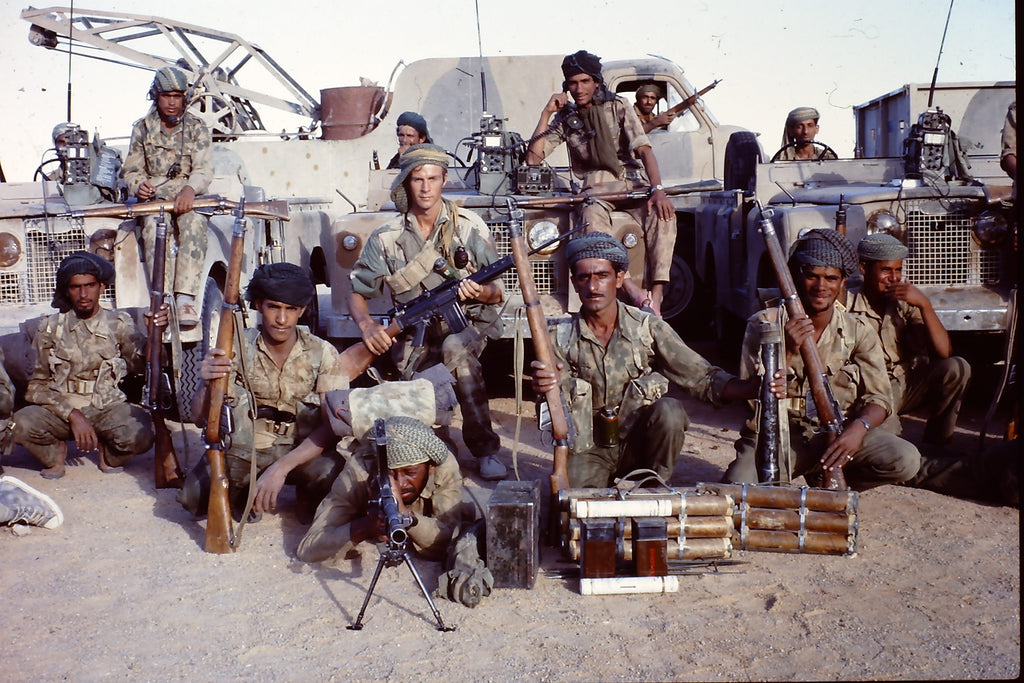
Skills for surviving an ambush
‘I spent a lot of time practising what happens when you get ambushed,’ he says. ‘At the crack of the very first bullet all your men must instantly fall down flat. I mean instantly. Both I and my sergeant would both carry white phosphorus grenades at all times. As everyone hit the deck we would throw our grenades, which would instantly produce a huge cloud like a thick mist in the direction of where the bullets were coming from. So you would no longer be visible to them. At this point I would very often shout, “Attack”. We all knew that if we shouted attack, it meant retreat. It was an easy way to confuse.’
What drives someone to push themselves to the very limits of who they are? In the case of Lawrence, Sir Ranulph believes it was in part conflicting feelings about his illegitimacy – while his father Sir Thomas Chapman was an aristocrat, his mother was a servant, herself illegitimate. This meant that Lawrence constantly felt the need to carve out a heroic identity for himself that would help to redress the shame surrounding his early family life. Sir Ranulph’s own background is very different, yet it’s defined by a tragedy that has etched itself into his character. His father was killed before he was born while fighting with the Royal Scots Greys in World War II, and he’s clearly driven by the huge sense of loss that comes from never having met him.
Courage and legacy
Those who live courageously are exceptional individuals, but there often comes a point where they must fight to hold other people to similar standards. Alongside his riveting account of the challenges Lawrence faced in the desert, Sir Ranulph also talks about his huge disillusionment when the war finished. When Lawrence realised the Allied powers did not intend to give the Arabs the territories they had promised them, he was consumed by depression, even refusing a Victoria Cross from King George V. He kept campaigning until three years later he staged a conference with Winston Churchill that would make Faisal, his fellow commander, King of Iraq.
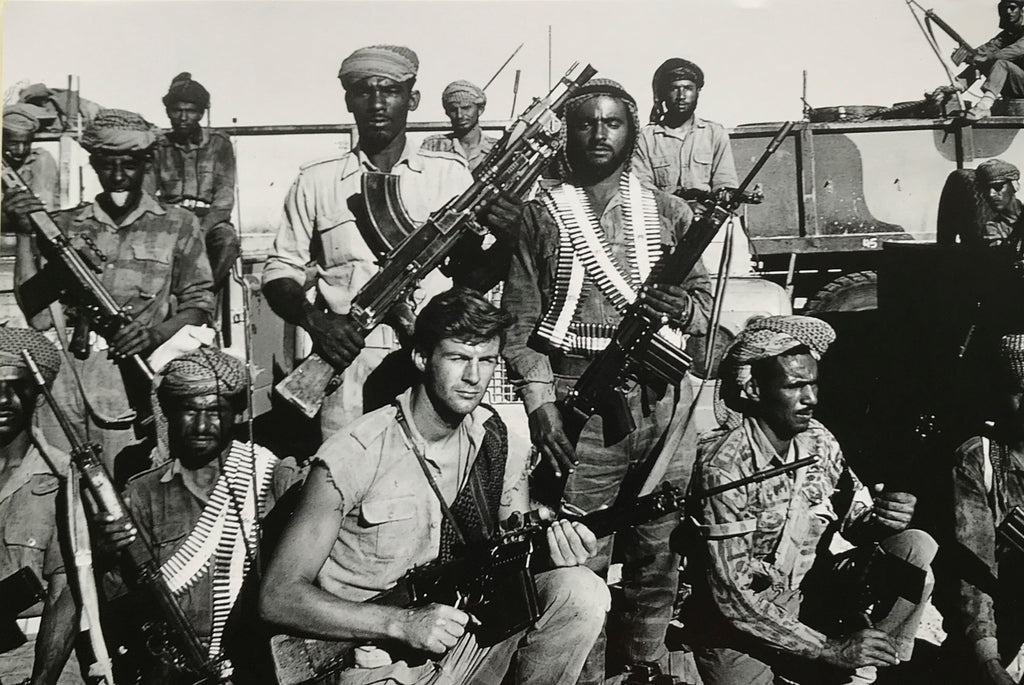
More than half a century after his own experiences fighting in the desert, Sir Ranulph is proud that he played a part in Oman becoming a wealthy, politically stable country with a fully developed infrastructure. Though he confesses to having his own crisis of conscience at the time when he worried whether the new money being made from oil was truly being distributed to benefit the whole country. When he confided in an Omani military leader, Staff Sergeant Abdullah, he was reassured that the Sultan waiting in the wings, Sultan Qaboos, would bring about the redistribution of wealth the communists promised without the brutality and enforced change of religion. That indeed proved to be the case and today Sir Ranulph feels fully vindicated in what he did.
Like Lawrence, he has clearly been shaped both as a human and as an explorer by those early desert experiences. ‘The men I fought with became more like a family than anything else,’ he says. ‘I have many extraordinary memories.’ As the rain continues to pour, it’s possible to hear the warmth in his voice. ‘Though it was one of the toughest times of my life it was also a very happy one.’

